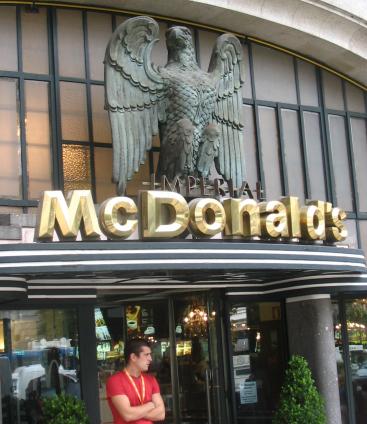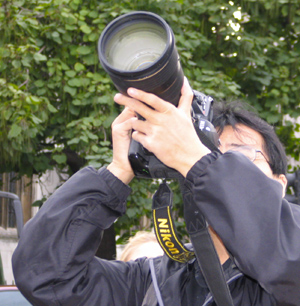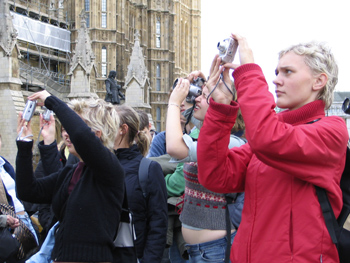We are developing the social individualist meta-context for the future. From the very serious to the extremely frivolous... lets see what is on the mind of the Samizdata people.
Samizdata, derived from Samizdat /n. - a system of clandestine publication of banned literature in the USSR [Russ.,= self-publishing house]
|
I love this story:
Historians have found that Britain’s first Indian restaurant was opened in 1809, in the midst of the Napoleonic wars and during the period in which Austen set Pride and Prejudice.
The Hindoostane Coffee House was established by Sake Dean Mahomed, an Indian-born entrepreneur, as a purveyor of Oriental food of the “highest perfection” in Marylebone, London, which at the time was a residential district for the well-off.
In my area of Pimlico, central London, there is an Indian restaurant right near my flat (aaahhh!) – said to be one of the oldest in London, dating back to the 1950s. But it appears that this now-established feature of culinary life has been going on since the age of Nelson, Wellington and William Wordsworth. An early example, in fact, of culinary globalization. It is not, in fact, all that surprising, since the desire for eastern spices and foodstuffs was an important economic incentive behind much of global trade at that time.
I can imagine how this story is going to change all those costume dramas set in the early 19th Century: “Pray excuse me sir X, but I am in urgent need of a chicken korma.”
Australian blogger Tex has an encounter with a former Green Party candidate, and learns a few things. Not least about economics, where Thom Lyons explains that:
Socialism is the syetem of choice is the most prosperous countries.
as well as several choice facts about 9/11, Cuba and the Encyclopedia Britannica.
Tex has more patience with this sort of character then I do. But the sad thing is that Lyons’ views are becoming more and more prevalent in Australian society.
Take my love, take my land, take me where I cannot stand.
I don’t care, I’m still free. You can’t take the sky from me.
Take me out to the black. Tell ’em I ain’t comin’ back.
Burn the land and boil the sea. You can’t take the sky from me.
Have no place I can be since I found Serenity
But you can’t take the sky from me.
– Joss Whedon
In these days of concern about violent Islamists running amok on our cities, it is always important to remember that other sources of violence can be found, such as the so-called animal rights campaigners:
A children’s nursery has become the latest target of animal rights threats, forcing it to stop providing child care vouchers to parents working for the animal testing group Huntingdon Life Sciences.
Leapfrog Day Nurseries, part of the education business Nord Anglia, said it was reviewing whether extra security measures were needed at its Peterborough nursery, which is nearest to the Life Sciences headquarters in Cambridgesire. It said it already employed “stringent security measures” to protect the children in its care.
Threatening a kiddies’ nursery. They must be so proud.
On a related matter, here is a fine essay taking the incoherent doctrine of animal rights apart. In my view, the doctrine is incoherent, although at the same time I think humans should seek to treat animals as kindly as possible, which is a very human-centric opinion to hold, of course.
“It is a irresistible to note that nearly everyone, including the wealth creator, is inclined to see the world of inner being, of the heart and soul, as being at odds with the commercial. Wealth creators seem shy of their success. It is often said that the Englishman has always preferred to be seen as a gentleman than as a creative, industrious or commercial person.”
Richard D. North, Rich is Beautiful, (page 199).
On a train from Manchester to Nottingham I was sitting at a table when I was joined (in Sheffield) by two academics from the University of Nottingham.
The two gentlemen talked (rather loudly) about the internal affairs of their department (which seemed to be a ‘social policy’ department, at least the term ‘social policy’ was used) and their nice trips to various European nations and to Australia, New Zealand and Japan.
What struck me was the total lack of interest in ideas that the academics showed – they both boasted of using the same talk again and again, and neither cared whether their talks represented the truth or made any contribution to knowledge.
I only spoke once. One of the academics was boasting of his trip to the “biggest city in New Zealand”, but could not remember the name of the place – so I told him it was called Auckland. But later he seemed to be under the impression that he was talking about the capital of New Zealand – so he may have meant Wellington.
For the rest of the time I just sat there in the hope that some sign of interest in ideas would be shown by either man, but it was not.
I remembered Professor R. of the Politics Department of the University of Nottingham. Professor R. had always been interested in ideas – although I can not say that I had always agreed with him.
Once at a conference in London I had expressed the fear that local councils would use the introduction of the Community Charge (the “Poll Tax”) as an opportunity to increase spending – and blame the bill on the new system (my own position was that a local sales tax would be the least bad option – as people could at least vote with their feet and shop in the cheapest areas thus, perhaps, forcing down the level of the tax).
Professor R. had replied that I was too cynical and that most politicians met well, they were just guided by mistake ideas. As my own view was that most politicians (and many other groups of people) were scum, our difference of opinion became quite sharp. Perhaps my anger was due to Professor R. reminding me of my father – a man who was betrayed so many times and yet maintained a strange (at least strange to me) faith in human beings.
Some years later (after some “modernization” of academic life) Professor R. killed himself.
As I have said he was man who was interested in ideas and valued them, but perhaps he had too much faith in human beings (just as, perhaps, I have too little faith in people).
I miss people like Professor R., they thought that other people were like themselves (and they are not), but the world would be a better place if they were correct and people (especially academics) were really honest and dedicated seekers after truth.
Still what would have I had heard had the two academics had been interested in ideas? The latest plan to reform the Welfare State – yet another pattern for the deckchairs on the Titanic?
Or (if the academics had been economists) the claim that the best way to promote prosperity was to “reduce interest rates and stimulate demand”.
I have even heard libertarians talking as if investment did not have to based on real savings ( fiat money and credit bubbles performing this function instead), and as if prosperity was based on consumption (rather than on work to produce goods and services of value to human beings). The madness of the boom bust cycle being presented as what “all serious economists” believe (as a columnist in the “Times” newspaper put it – referring to his idea that Germany’s economic situation could be improved by issuing more money “stimulating demand”).
What is worse? People who are not interested in ideas, or works of political philosophy, economics (and other subjects) that are filled with absurd nonsense and seeing this nonsense repeated in so many places, from leading universities to television and the newspapers?
In the last couple days I have written, and then deleted unpublished, several articles about the IRA’s much ballyhooed decommissioning (or ‘decommissioning’, depending on what you believe to be the truth) of its weapons. In short, I am not sure what I think.
To try and make head or tail of what is going on, I have been hanging out at Slugger O’Toole.
And I still cannot figure out if it is cause to celebrate or just another ploy.
I went out this afternoon to partake of coffee with a friend, and on my way to the coffee house, I stumbled upon a news story, and took some photos of it.
Who is that?, I asked. A Father 4 Justice. Oh, one of them.
Cheap, modern, democratised communications pervade this story, and may also influence the reporting of it. Note that the guy has a portable telephone, which would probably not have been the case a decade ago, and which must surely have influenced how the authorities set about dealing with him. I mean, if you were a copper, it might make a difference if the guy you were trying to arrest was supplying a running commentary of your every move to his pals. Who were recording everything he said, as they surely were.
Other photographers were already out in force by the time I got there.
The professionals were there in strength.
But, so were the amateurs, …
… me included, with my 10x zoom lens and automatic anti-shake focussing, in a camera that cost less than three hundred quid.
One of the features of modern government, or maybe that should be recent government, is that modern/recent government often likes simply to blot stories off the airwaves. I am not saying that they wanted to squash this one. But I am saying that if they had entertained any such censorious thoughts, although they might have got away with this ten years ago, now, they would have far less chance.
They would merely have handed the blogosphere a nice little scoop.
Tony Blair gave his annual Labour Party conference speech to the party faithful (and not-so-faithful) in Brighton this afternoon. He touched on a variety of issues but this series of quotes stands out and reminds us, as if we needed reminding, that this is one of the most illiberal governments since the Second World War:
We are trying to fight 21st century crime – ASB (anti-social behaviour) drug-dealing, binge-drinking, organised crime – with 19th century methods, as if we still lived in the time of Dickens. The whole of our system starts from the proposition that its duty is to protect the innocent from being wrongly convicted. Don’t misunderstand me. That must be the duty of any criminal justice system. But surely our primary duty should be to allow law-abiding people to live in safety.
It means a complete change of thinking. It doesn’t mean abandoning human rights. It means deciding whose come first.
The emphasis is unmistakeable, however much Blair tries to soften the authortarian message with assurances about defending the rights of accused persons. Under this government, the traditional checks and balances of the Common Law, already eroded by the previous Tory government, have decayed at an accelerating pace. The right to trial by jury, habeas corpus, double-jepoardy, admissability of previous conviction details… the list of protections that have been wiped out or been eroded gets longer and longer.
Blair, being the crafty sonafabitch he is, understands how easy it is to portray we defenders of civil liberties as “soft on crime”, and so the point to stress must be to challenge the false choice he offers: be liberal or be safe.
Far from making us safer, playing fast and loose with the Common Law protections of the individual are having the opposite effect in the medium and long run. Weakening the right to self defence emboldens burglars. And dismantling traditional legal safeguards will undermine respect for the rule of law among the otherwise law-abiding, to no good effect. And yet when people are convicted of serious crimes like rape and burglary, the offenders often regain their liberty after a relatively brief period in jail, making no restitution to their victims.
Blair, and for that matter the Tories, have still not grasped the fact that it can and should be possible to crack down hard on crime while protecting our ancient liberties. Or is that too subtle for for our political classes to grasp? Is there some great nugget of wisdom in the Blair speech that I missed?
Those so inclined to read Blair’s speech in full can go here.
The convincing win by the anti-leftist coalition in Poland’s elections would seem to be one in the eye for the statist left.
However the perils of the left/right labels are on prominent display here: Civic Platform Party is clearly on the side of the angels in most ways, being pro-market, pro-privatisation and generally in favour of liberty and a smaller state (though sadly they seem to think the €uro is actually a good idea).
Yet the senior partner in the winning team, the Law and Justice Party are really old style paleo-conservative statists, comparable to various European Christian Democrat parties. Although the Law and Justice Party are perhaps a bit more reactionary and stasis oriented than most Christian Democrats (and as a result no great fans of free-markets), at least that right-stasis orientation gives them a healthy euro-scepticism.
It will be interesting to see how this coalition manages to square its various circles or even holds together at all.
I have long defended an American corporation, much hated by anti-globalisation types, greens, leftists, even many conservatives. While many seem to think that the mission of said corporation is to destroy all that is good in the world and to act as a back door through which America can destroy local colour and local traditions, I have found it hard to fault a company that sells hamburgers to people who voluntarily choose to consume them, that has introduced the concept of the public toilet to many parts of the world where the idea was lacking, and generally provides excellent customer service to go with its slightly questionable food. I have found it hard to see anything sinister in that.
But alas, in the Praça da Liberdade in Porto on Saturday, I discovered that those brave battlers against corporate domination of the world were right. For the era of concealment is over. McDonald’s restaurants are now established in most of the world, and they can finally allow their true ambitions and the true scope of their mission to become clear. The time for hiding is now, clearly, over.

I will confess that despite their obvious sinister ambitions, I quite like the new logo.
Rumour has it that Brian Micklethwait is aging nicely…
Many happy returns.
|
Who Are We? The Samizdata people are a bunch of sinister and heavily armed globalist illuminati who seek to infect the entire world with the values of personal liberty and several property. Amongst our many crimes is a sense of humour and the intermittent use of British spelling.
We are also a varied group made up of social individualists, classical liberals, whigs, libertarians, extropians, futurists, ‘Porcupines’, Karl Popper fetishists, recovering neo-conservatives, crazed Ayn Rand worshipers, over-caffeinated Virginia Postrel devotees, witty Frédéric Bastiat wannabes, cypherpunks, minarchists, kritarchists and wild-eyed anarcho-capitalists from Britain, North America, Australia and Europe.
|







